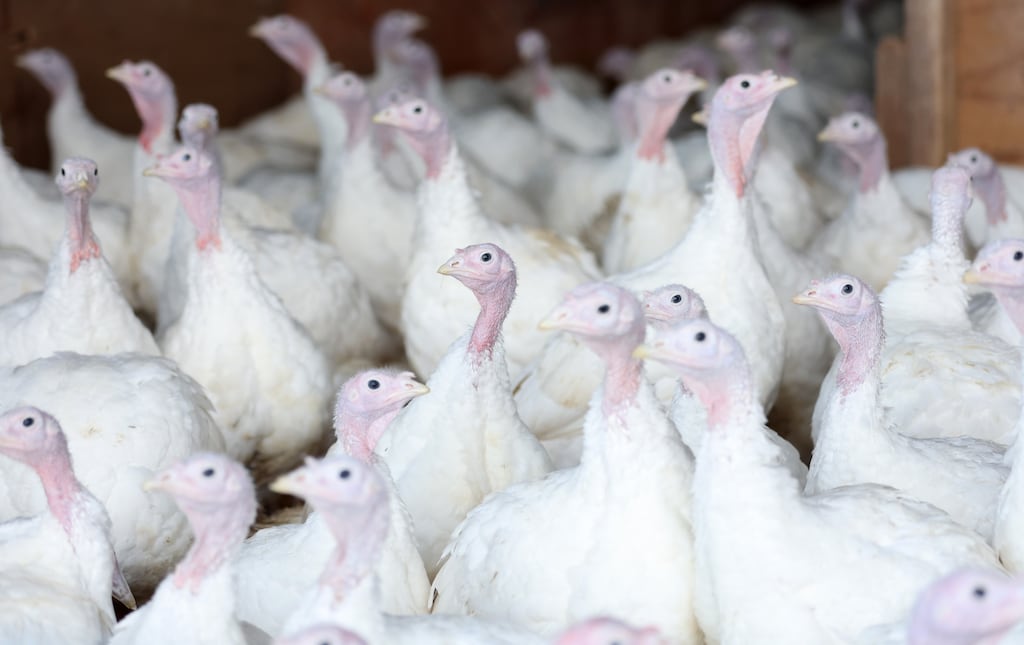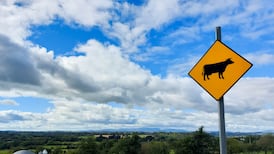There needs to be a “laser-like focus on biosecurity” following confirmation of a second bird flu outbreak, the Irish Farmers’ Association (IFA) has said.
The statement comes after another outbreak of the highly pathogenic bird flu was confirmed on Wednesday at a commercial turkey flock in Co Meath. On Tuesday, local emergency restriction measures were imposed around a turkey flock in Co Carlow.
IFA poultry chair Nigel Sweetnam urged flock owners to “work to guarantee the tightest controls are in place”.
“The housing order takes effect from next Monday, but producers should house their birds now and take the necessary steps to protect their birds,” he added.
READ MORE
Meanwhile, the HSE is urging people in regular close contact with poultry, waterfowl or pigs to avail of the free flu vaccine to protect them because of the occupational risk if exposed to bird flu.
Dr Eamonn O’Moore, director of national health protection with the HSE, told RTÉ Radio’s Morning Ireland that it was important to recognise there was a risk in those occupations.
“The concern is that when you have bird flu, which is an entirely and normally avian problem, there can be a degree of risk of mixing if you have a person with Influenza A, human type, and then exposed to bird flu. There is a theoretical risk of mixing, which is why we want to ensure that to avoid that we protect occupationally exposed people.”
Dr O’Moore was speaking about the HSE’s current campaign offering the flu vaccine to those with weakened immune systems, older people and those with other medical conditions.
Speaking on RTÉ’s Morning Ireland on Wednesday, Dr June Fanning, the Department of Agriculture’s chief veterinary officer, said the strain of bird flu circulating is “low risk” to humans.
“However, the advice still is that if people come across sick or dead wild birds, or if they’ve poultry themselves that are sick, not to touch or interact with the birds because there is that human health risk, however low,” she said. “Unfortunately for birds, it’s a highly pathogenic strain. It’s very contagious, so it spreads very easily between birds and it also causes severe signs, including death, in the birds.”
On Wednesday, Minister for Agriculture Martin Heydon announced a compulsory housing order for all poultry and captive birds as part of measures to minimise the risk of bird flu spreading.
Mr Heydon said the action, which takes force from next Monday, will “reduce the threat to our industry and to our poultry farmers’ livelihoods”. Poultry and captive birds must, from November 10th, be housed or confined, he said.
Restriction zones have been established around the affected holdings, comprising a 3km protection zone and a 10km surveillance zone.
Mr Sweetnam said producers “should go through their biosecurity protocols in detail and ensure there are no gaps anywhere”.
“Housing the birds is an additional protection, but effective biosecurity protocols that minimise the risk are our number one defence,” he said.
Dr Fanning said on Wednesday the current outbreak is “quite small” and there is no concern about stocks of turkeys for Christmas.
However, turkey farmer Robert Fitzsimons has warned that if more cases of bird flu occur in the coming days and weeks then there could be a shortage of turkeys for the festive season.
Mr Fitzsimons, who has a turkey farm near Midleton in East Cork, and has a flock of 3,000 turkeys, told Morning Ireland on Thursday that he had been keeping his flock indoors for some time since he was informed by a local vet that there could be an outbreak in nearby Fota wildlife park.
His farm had increased biosecurity measures such as changing clothing, disinfecting footwear and taking care when feeding the birds.
“It’s in the wild. There’s nothing going to stop it. You know, there’s dead birds in the vicinity of where we live. I’m in the flight path of the migratory birds.
"If this gets worse, it could be very, very serious.”










